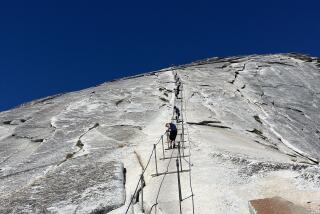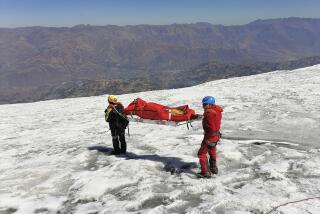Everest Conqueror Hillary Still Helps Sherpas
- Share via
AUCKLAND, New Zealand — Almost 40 years after he and Tenzing Norgay became the first men to conquer Everest, Sir Edmund Hillary is as busy as ever touring the world to raise money for his beloved Sherpa people in the Himalayas.
Now 72 and facing the prospect of circling the globe seven times this year, this “very average bloke” wishes he could take life a little easier. His uphill battle continues to produce funds for schools, medical facilities and other projects.
“I feel a deep sense of responsibility for these people in the Himalayas,” Hillary said. “These are all projects which I really feel are worthwhile, and I don’t want to see them just going into decline when I get a bit too old and decrepit to contribute to them.”
His home is full of Tibetan rugs, paintings and furniture, Nepalese curios and hundreds of books on the area. Hillary has written several books about his exploits.
By the look of him, this tall and muscular pioneer should be attending dinners and delivering lectures for some years yet, as he has done, almost nonstop, since he scaled the world’s highest peak on May 29, 1953.
This beekeeper’s adventures did not end with climbing Everest. In 1958, he reached the South Pole. In 1977, he jet-boated to the source of the Ganges River. In 1985, he was made New Zealand high commissioner (ambassador) to India. This year he will become the first living New Zealander to be pictured on on a currency note.
Hillary retains the modesty that allowed him to enter the social whirl of black-tie functions with a refreshing attitude and down-to-Earth language.
“Well, we knocked the bastard off,” were the words he chose to tell the world that he and Tenzing had climbed Everest.
For his efforts he was awarded a knighthood, but given the choice he probably would have spurned it, since he was just a young lad in search of a bit of adventure.
These days, of course, the “penny-a-dozen” people who climb Everest, including his son Peter, are well aware of the promotional and financial spinoffs, he said.
“I was very surprised at the media and public response after our ascent of Everest,” Hillary said. “I thought it might be worth an interview or two, but I really didn’t have any idea at all as to the impact. . . . It probably just happened to fill the gap in news in the world at the time.”
His name is in the telephone book, so people from all over the world can call him for a chat and schoolchildren can ask for help with their homework. It’s not something he encourages, but, what the hell?
Celebrations are planned for the 40th anniversary of his ascent next year, but Hillary is not sure if he will take part. “I can’t quite see why the 40th anniversary should be different from the 25th or the 41st anniversary. To me, it doesn’t seem to have too much basis for getting excited about.”
The Himalayan Trust raises about $250,000 annually for projects in that area. During more than 100 trips to Nepal, he has supervised and helped out on construction and aid efforts in consultation with Sherpa leaders.
Trust branches around the world organize events that Hillary attends. He usually gives a brief summary of his ascent and shows his battered slides, then talks about the projects the Trust funds. After all these years, he is still a top draw and is amazed that people are so intrigued.
The growing awareness of environmental issues has added a new dimension to his efforts, especially since he was championing the cause long before it became fashionable.
He once recommended that Everest, which is littered with debris and the occasional body from previous expeditions, be closed down for five years to allow it to recuperate.
That call was an attempt to draw attention to the problems and not meant as a serious remedy, one which would have a deep effect on the local economy. Despite some cleanup expeditions, the conditions get worse, and no one seems to know what to do.
The Trust is not sure what it will do to raise money once Hillary bows out. It always thought demand for funds would wane, allowing it to wind up and let the Sherpas get on with their enriched lives. This has not happened. Attempts to cut down on projects have been met with fresh appeals from other needy ones.
“I’d be delighted if some big corporate said, ‘Ed, it’s time you retired and took it easy, and we’ll undertake to finance your activities in the Himalayas for the next five years’,” Hillary says.
Until that time, this restless man continues his crusade.






